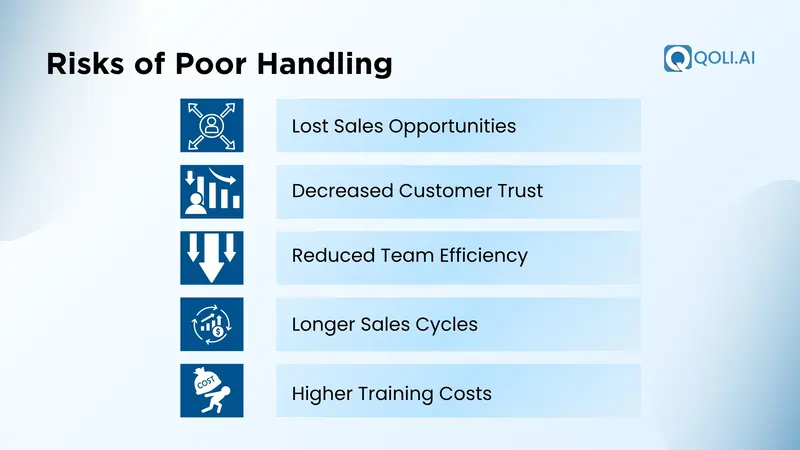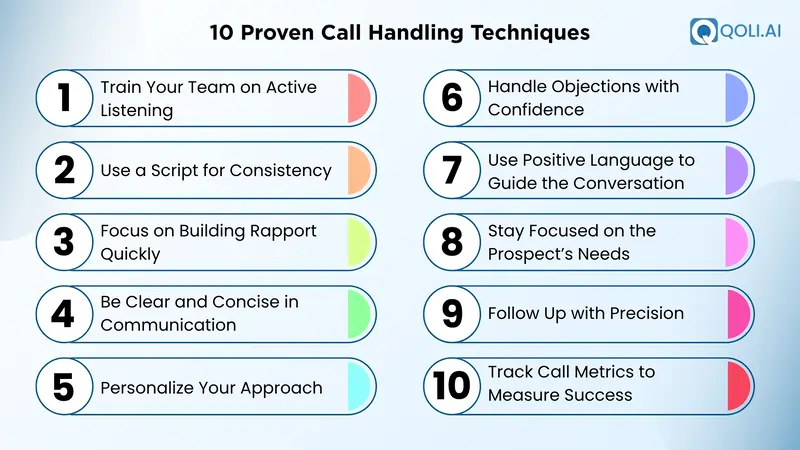10 Call Handling Techniques to Boost Sales Team Performance
Discover 10 powerful call handling techniques to improve your sales team's performance, boost customer satisfaction, and close more deals.
Author: Aasritha Sai
Discover 10 powerful call handling techniques to improve your sales team's performance, boost customer satisfaction, and close more deals.
Author: Aasritha Sai

Every call your sales team makes is an opportunity to connect, build trust, and, most importantly, close a sale. But how your team handles those calls can make all the difference. Effective call handling isn’t just about talking, it’s about listening, guiding the conversation, and ensuring that every interaction moves the prospect closer to a decision.
Poor call handling can quickly leave a bad impression and harm your brand reputation.
According to the Emplifi report, 86% of consumers will leave a brand they trusted after only two poor customer experiences.
So, how can you avoid this? By mastering effective call handling techniques. In this blog, I’ll cover 10 simple but powerful strategies that can help your sales team handle calls with confidence, improve customer satisfaction, and ultimately close more deals.
Call handling is how your team talks to customers or leads on the phone. It's about how your team answers calls, addresses concerns, and handles follow-ups. From the tone of your reps to how your team handles problems, call handling shapes the entire customer experience. When call handling is done correctly, it builds trust, improves conversions, and sets your brand apart.
There are two types of call handling that your sales team will handle:
Both types demand different approaches, but they both need the same core skills: listening, clarity, and follow-through.
Every sales call is a chance to move a deal forward or lose it. When your team knows how to handle calls properly, they ask better questions, listen more closely, and respond in a way that feels natural. This helps them build trust faster and keeps the conversation on track.
Good call handling also saves time. Your team gets to the point quickly, avoids confusion, and shows prospects they are dealing with professionals. When your reps sound confident and clear on every call, prospects notice and are more likely to say yes.
Call handling plays a big role in how your team connects with potential buyers. When call handling is performed well, each conversation feels clear, easy, and worth the customer’s time. And when calls go smoothly, your overall sales performance starts to improve.
Here’s what makes your call handling effective:
👉 You Might Like This: Top 7 Best Call Center Software for Small Businesses
When your team knows how to handle sales calls the right way, every conversation becomes more useful. Instead of just talking, they ask the right questions, listen closely, and guide the prospect toward the next step. Here are some benefits of effective call handling:
Better calls lead to better results. It’s that simple.
Poor call handling practices can severely impact your sales team's performance and damage your company's reputation. Here are the risks you should avoid:

Fixing call handling early saves you from losing deals.
Your team doesn’t need to sound perfect on every call. But they do need to stay clear, calm, and in control. These 10 techniques will help your reps handle calls with more confidence and turn more conversations into real sales:

Active listening allows your team to understand prospects more deeply, building stronger connections and trust. By fully focusing on what the prospect is saying, your team can respond more thoughtfully and address their needs more effectively. This not only helps in creating a more meaningful conversation but also increases the chances of turning a prospect into a customer. 70% of customers are more likely to buy from a company that listens to their concerns during a call. To improve active listening:
When your team listens well, your calls feel less like a sales call script and more like real conversations. That’s what builds trust and leads to better sales performance.
A good call script gives your sales team a clear structure to follow, so every call feels professional and on track. It helps your reps stay focused and confident. Your script should include:
To keep your sales call script working well, make sure it feels natural to say out loud, keep updating it based on what your team hears from clients, and connect it to your CRM, use a digital format that’s easy to access during calls.
The first few moments of a call shape the rest of the conversation. A relaxed, friendly start helps the buyer feel at ease and more open to talk. When your reps sound too formal or straight to the point, it can create distance.
The LAER framework provides a structured approach to building meaningful connections:
Start simple, use the buyer’s name, keep the tone light, and show genuine interest. Even a small comment like “I saw your recent update online” or “Hope your morning is going well” can warm up the call. A little connection at the start makes it easier to have a real conversation.
Clear communication drives successful sales calls. Your message needs to be direct, purposeful, and easily understood by your prospects.
Every client is different. Their goals, pain points, and expectations are not the same. That is why your team should avoid generic talk and shape the conversation around what matters to that specific person or business.
Personalization can be simple. Mention something relevant to their role or industry. Bring up a challenge they are likely facing. The goal is to make them feel like you came prepared, not like you are reading from a script.
Buyers will have questions or doubts, which is a normal thing. What matters is how your team responds. Instead of getting nervous or trying to avoid the topic, reps should stay calm and listen closely, a confident reply helps build trust.
Here are a few ways to make it easier:
Using a powerful call management tool like Qoli allows your team to easily review their past call recordings, giving them the confidence to handle objections. With Qoli, you can monitor how effectively your team handles objections and gain valuable insights into areas that need improvement.
With Qoli's Call Log Monitor, you can effortlessly review every call your team handles. This feature tracks important details such as call times, duration, and key points discussed, giving your team the opportunity to learn and improve from each conversation.
The way your team speaks can shape the whole call. Positive language helps buyers feel more comfortable and open to what you are saying. Instead of saying what cannot be done, shift the focus to what is possible.
Every sales call should revolve around what the prospect actually needs, not just what you’re selling. If your team leads with features instead of listening, they miss the chance to solve real problems.
Help your reps start each call by learning about the prospect’s goals, challenges, and priorities. Once they understand that, they can explain how your product fits. When you demonstrate genuine interest in their needs, you create meaningful connections that lead to higher sales conversion rates.
Following up is not just about sending a quick “just checking in” message. It's about staying helpful and relevant after the call. When your team follows up with a clear purpose like answering open questions, sharing useful info, or recapping next steps, it shows the prospect that you’re paying attention. This kind of follow-up also improves your customer satisfaction index.
Tracking call metrics helps you understand how your team is performing. Look at the number of calls made, how long each call lasts, and how many lead to the next step. This gives you a clear picture of what your team is doing well and where they might need help. It also supports better business communication skills by showing how each rep handles calls, follows up, and responds to customer needs. These are the key metrics to consider:
Reviewing these details helps identify strengths and areas that need work. This way, you can guide your team better and help them close more deals.
When your sales team applies these call handling techniques, you start to see real changes. Calls become more focused, and your team feels more confident in managing conversations. This creates stronger connections with customers and helps move deals forward smoothly.
Here’s what you can expect when using these techniques:
Mastering call handling is one of the smartest moves you can make to boost your sales team’s performance. When your reps listen actively, communicate clearly, and handle objections with confidence, every call becomes an opportunity to build trust and close deals.
By staying focused on the prospect’s needs and following up, your team will stand out from the competition. Tracking call metrics lets you see what is working and where to improve, so success keeps growing. Start applying these techniques today and watch your sales team become more confident, productive, and successful with every call.